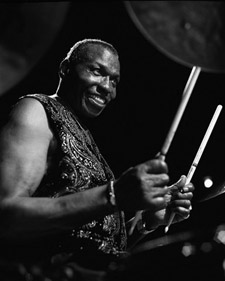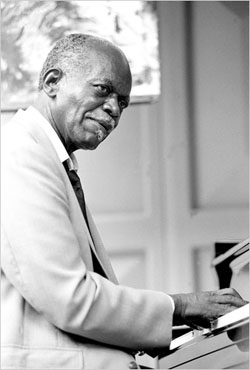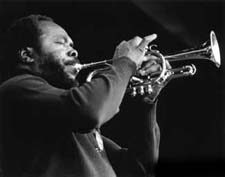The Jones Brothers

Photographed: Elvin Jones
Elvin Jones
Elvin “The Emperor” Jones was best known for his association with the classic John Coltrane Quartet (1960-1965) but he also had a notable career as a bandleader and continued to be a major influence in music. One of the all-time great drummers (bridging the gap between advanced hard bop and the avant-garde), Jones is the younger brother of a remarkable musical family that also includes Hank and Thad Jones. After spending time in the Army (1946-1949), he was a part of the very fertile Detroit jazz scene of the early ’50s.
He moved to New York in 1955, worked with Teddy Charles and the Bud Powell Trio, and recorded with Miles Davis and Sonny Rollins (the latter at his famous Village Vanguard session). After stints with J.J. Johnson (1956-1957), Donald Byrd (1958), and Harry “Sweets” Edison, Jones became an important member of John Coltrane’s Quartet, pushing the innovative saxophonist to remarkable heights and appearing on most of his best recordings. When Coltrane added Rashied Ali to his band in late 1965 as second drummer, Jones was reportedly not pleased and soon departed.
He went on a European tour with the Duke Ellington Orchestra and then started leading his own groups, which in the ’90s became known as Elvin Jones’ Jazz Machine. He remained active well into the 2000s and continued to push himself musically with the Jazz Machine, inviting young lions into the fold and touring regularly. Jones recorded as a leader for many labels including Atlantic, Riverside, Impulse, Blue Note, Enja, PM, Vanguard, Honey Dew, Denon, Storyville, Evidence, and Landmark.
His dedication to and love of the drums were such that even in the face of health problems he continued to mount the drum stand, occasionally accompanied by an oxygen tank. On May 18, 2004, drum legend Elvin Jones suffered heart failure and passed away.

Photographed: Hank Jones
Hank Jones
The oldest of the three illustrious Jones brothers (along with Thad and Elvin), Hank Jones was also the first of the great Detroit pianists (including Tommy Flanagan, Barry Harris, and Roland Hanna) to emerge after World War II, although by then he had long since left town. Jones played in territory bands as a teenager, and in 1944, he moved to New York to play with Hot Lips Page.
Influenced by Teddy Wilson and Art Tatum, Jones’ style was also open to bebop, and his accessible playing was flexible enough to fit into many genres. He was on several Jazz at the Philharmonic tours (starting in 1947), worked as accompanist for Ella Fitzgerald (1948-1953), and recorded with Charlie Parker. In the ’50s, Jones performed with Artie Shaw, Benny Goodman, Lester Young, Cannonball Adderley, and many others.
He was on the staff of CBS during 1959-1976 but always remained active in jazz. In the late ’70s, Jones was the pianist in the Broadway musical Ain’t Misbehavin’ and he recorded with a pickup unit dubbed the Great Jazz Trio which, at various times, included Ron Carter, Buster Williams, or Eddie Gomez on bass, and Tony Williams, Al Foster, or Jimmy Cobb on drums.
As a leader, Hank Jones recorded for many labels, including Verve, Savoy, Epic, Golden Crest, Capitol, Argo, ABC-Paramount, Impulse!, Concord, East Wind, Muse, Galaxy, Black & Blue, MPS, Inner City, and Chiaroscuro.
Hank Jones died in New York City on May 16, 2010, at the age of 91.

Photographed: Thad Jones
Thad Jones
A harmonically advanced trumpeter/cornetist with a distinctive sound, as well as a talented arranger/composer, Thad Jones (the younger brother of Hank and older brother of Elvin) had a very productive career. Self-taught on trumpet, he started playing professionally with Hank Jones and Sonny Stitt when he was 16.
After serving in the military (1943-1946), Jones worked in territory bands in the Midwest. During 1950-1953 he performed regularly with Billy Mitchell’s quintet in Detroit and he made a few recordings with Charles Mingus (1954-1955). Jones became well-known during his long period (1954-1963) with Count Basie’s Orchestra, taking a “Pop Goes the Weasel” chorus on “April in Paris,” and sharing solo duties with Joe Newman. While with Basie, Jones had the opportunity to write some arrangements and he became a busy freelance writer after 1963.
He joined the staff of CBS, co-led a quintet with Pepper Adams, and near the end of 1965, organized a big band with drummer Mel Lewis that from February 1966 on, played Monday nights at the Village Vanguard. During the next decade the orchestra became famous and gave Jones an outlet for his writing. He composed one standard (“A Child Is Born”) along with many fine pieces including “Fingers,” “Little Pixie,” and “Tiptoe.”
Among the sidemen in the Thad Jones-Mel Lewis Orchestra (which started out as an all-star group and later on featured younger players) were trumpeters Bill Berry, Danny Stiles, Richard Williams, Marvin Stamm, Snooky Young, and Jon Faddis, trombonists Bob Brookmeyer, Jimmy Knepper, and Quentin Jackson, the reeds of Jerome Richardson, Jerry Dodgion, Eddie Daniels, Joe Farrell, Pepper Adams, and Billy Harper, pianists Hank Jones and Roland Hanna, and bassists Richard Davis and George Mraz.
In 1978, Jones surprised Lewis by suddenly leaving the band and moving to Denmark, an action he never explained. He wrote for a radio orchestra and led his own group called Eclipse. In late 1984 Jones took over the leadership of the Count Basie Orchestra but within a year bad health forced him to retire.
Thad Jones recorded as a leader for Debut (1954-1955), Blue Note, Period, United Artists, Roulette, Milestone, Solid State, Artists House, A&M, Metronome, and many of the Thad Jones-Mel Lewis Orchestra’s best recordings have been reissued.
Biographies by Scott Yanow

